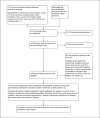Environmental Interventions to Reduce the Consumption of Sugar-Sweetened Beverages: Abridged Cochrane Systematic Review
- PMID: 32784303
- PMCID: PMC7590771
- DOI: 10.1159/000508843
Environmental Interventions to Reduce the Consumption of Sugar-Sweetened Beverages: Abridged Cochrane Systematic Review
Abstract
Background: Regular consumption of sugar-sweetened beverages (SSB) can increase the risk for obesity, type 2 diabetes, cardiovascular disease, and dental caries. Interventions that alter the physical or social environment in which individuals make beverage choices have been proposed to reduce the consumption of SSB.
Methods: We included randomised controlled, non-randomised controlled, and interrupted time series studies on environmental interventions, with or without behavioural co-interventions, implemented in real-world settings, lasting at least 12 weeks, and including at least 40 individuals. Studies on the taxation of SSB were not included, as these are subject of a separate Cochrane review. We used standard Cochrane methods for data extraction, risk of bias assessment, and evidence grading and synthesis. Searches were updated to January 24, 2018.
Results: We identified 14,488 unique records and assessed 1,030 full texts for eligibility. We included 58 studies comprising a total of 1,180,096 participants and a median length of follow-up of 10 months. We found moderate-certainty evidence for consistent associations with decreases in SSB consumption or sales for the following interventions: traffic light labelling, price increases on SSB, in-store promotion of healthier beverages in supermarkets, government food benefit programs with incentives for purchasing fruits and vegetables and restrictions on SSB purchases, multi-component community campaigns focused on SSB, and interventions improving the availability of low-calorie beverages in the home environment. For the remaining interventions we found low- to very-low-certainty evidence for associations showing varying degrees of consistency.
Conclusions: With observed benefits outweighing observed harms, we suggest that environmental interventions to reduce the consumption of SSB be considered as part of a wider set of measures to improve population-level nutrition. Implementation should be accompanied by evaluations using appropriate methods. Future studies should examine population-level effects of interventions suitable for large-scale implementation, and interventions and settings not yet studied thoroughly.
Keywords: Cochrane; Interventions; Sugar-sweetened beverages; Systematic review.
© 2020 The Author(s) Published by S. Karger AG, Basel.
Conflict of interest statement
All authors have completed the ICMJE uniform disclosure form at
References
-
- de Ruyter JC, Olthof MR, Seidell JC, Katan MB. A trial of sugar-free or sugar-sweetened beverages and body weight in children. N Engl J Med. 2012 Oct;367((15)):1397–406. - PubMed
-
- Ebbeling CB, Feldman HA, Osganian SK, Chomitz VR, Ellenbogen SJ, Ludwig DS. Effects of decreasing sugar-sweetened beverage consumption on body weight in adolescents: a randomized, controlled pilot study. Pediatrics. 2006 Mar;117((3)):673–80. - PubMed
-
- Imamura F, O'Connor L, Ye Z, Mursu J, Hayashino Y, Bhupathiraju SN, et al. Consumption of sugar sweetened beverages, artificially sweetened beverages, and fruit juice and incidence of type 2 diabetes: systematic review, meta-analysis, and estimation of population attributable fraction. BMJ. 2015 Jul;351:h3576. - PMC - PubMed
Publication types
MeSH terms
LinkOut - more resources
Full Text Sources
Other Literature Sources


